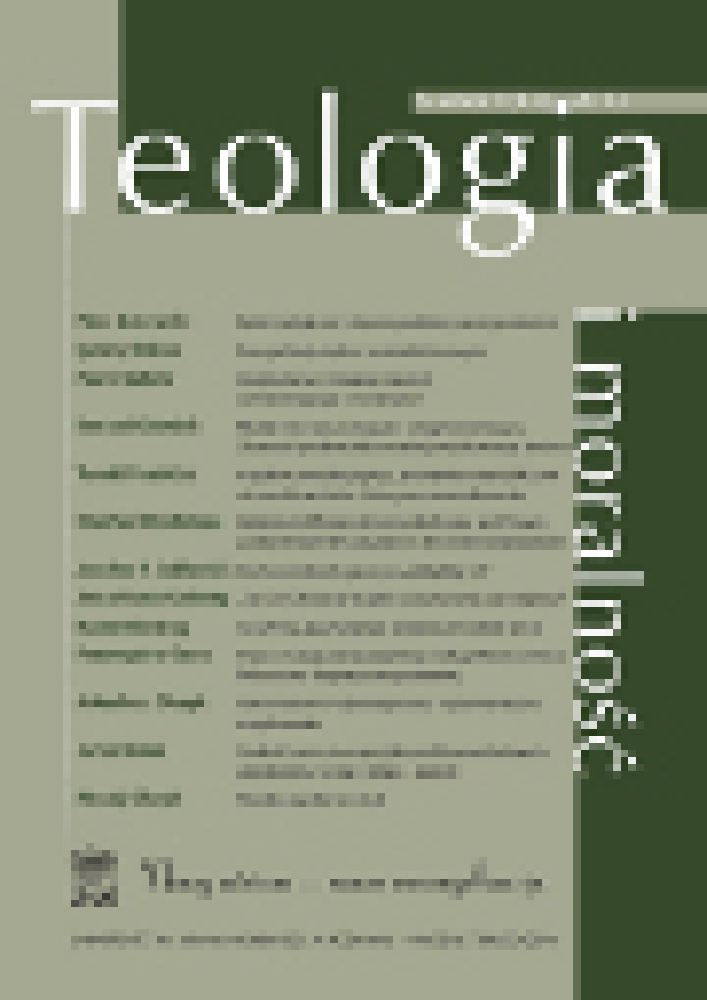Abstract
There is no one-dimensional man. The desire inscribed into the nature of human being is stronger than broadcasted ideologies or reductive anthropological concepts. Even those who methodically try to exclude God from the sphere of human quest are aware of this. An example of this is A. Comte-Sponville's proposal to create spirituality without God. He is trying to show that concepts such as faith or spiritual bond could be replaced with their counterparts - faithfulness or vision of bond as sharing without dividing.
In the present article the author tries to show the inconsequence of such an approach and to present the concept of living "as if God existed" as a thesis worth reflecting on. Spirituality, as understood by the author of the article, is the "life of living", a driving force that gives ultimate sense and purposefulness to human existence. Such an understanding of spirituality requires faith in the personal aspect - man needs such a point of adhesion to which he can refer entirely: with reason and will. A counterbalance to the proposal of spirituality without God is living "as if God existed". Such an approach is not about imitating the life of faith but about reminding oneself that excluding God from the horizon of quest is just man's arbitrary decision, and therefore has little to do with the rationality of being. The consequence of accepting this proposal is the necessity of re- defining concepts such as faith, freedom, or communication, and restoring a proper relation between faith and reason. A further consequence is the conviction that the only way to "disenchant" the world is to "enchant" it again with the hope coming from faith.
References
Benedykt XVI, Homilia na Placu Inwalidów w Paryżu (13.09.2008), cyt. za L. Knabit, Jakby Boga nie było. O nowych grzechach i bożkach, z ojcem Leonem rozmawia Agnieszka Nieć, Tyniec 2010.
Benedykt XVI, Msza św. w uroczystość świętych Apostołów Piotra i Pawła (29.06.2009) - http://www.opoka.org.pl/biblioteka/W/WP/benedykt_xvi/homilie/pp_29062009.html.
Benedykt XVI, Wiara, rozum, uniwersytet – wspomnienia i refleksje, wykład na uniwersytecie, 12 września 2006 r. Ratyzbona –http://www.opoka.org.pl/biblioteka/W/WP/benedykt_xvi/przemowienia/bawaria_ ratyzbona_12092006.html.
Benedykt XVI, Wiara, rozum, uniwersytet – wspomnienia i refleksje, wykład na uniwersytecie, Ratyzbona 12.09.2006 r.
Bruncz D., Jak luteranin czyta Benedykta XVI? - http://fra3.pl/D-Bruncz-Jak-luteranin-czyta-Benedykta-XVI,a,14936.
Comte-Sponville A., Duchowość ateistyczna. Wprowadzenie do duchowości bez Boga, Warszawa 2011.
Comte-Sponville A., L’Esprit de l’athéisme. Introduction à une spiritualité sans Dieu, Paris 2010.
Comte-Sponville A., Mały traktat o wielkich cnotach, Warszawa 2000.
Depo W., Homilia na Jasnej Górze podczas XVII Pielgrzymki Rodziny Radia Maryja, za Serwisem Radia Watykańskiego z 12 lipca 2009 roku.
Dostojewski F., Bracia Karamazow, Kraków 2009.
Góźdź K., Teologia człowieka. Z najnowszej antropologii niemieckiej, Lublin 2006.
Guy B., Dieu et la science. Deux recherches différentes, Saint Etienne 2009.
Halík T., Teatr dla aniołów. Życie jako religijny eksperyment, tłum. A. Babuchowski, Kraków 2011.
Jan Paweł II, Elbląg 6 czerwca 1999, Przemówienie podczas nabożeństwa czerwcowego - http://mateusz.pl/jp99/pp/1999/pp19990606c.htm.
Jan Paweł II, Encyklika Fides et ratio.
Jan Paweł II, Encyklika Veritatis splendor.
Kiereś H., Człowiek i cywilizacja, Lublin 2007.
Korab-Karpowicz W.J., Religia, rozum i to co zostało utracone. Dyskusja z Jürgenem Habermasem, „Wrocławskie Studia Erazmiańskie”, z. 5:
Religia a prawo i państwo, red. M. Sadowski, P. Szymaniec, Wrocław 2011.
Leśniak M., Cywilizacja miłości, w: Encyklopedia Nauczania Społecznego Jana Pawła II, red. A. Zwoliński, Radom 2003.
Levada W., Prefekt Kongregacji Nauki Wiary, wypowiedź z 30 kwietnia 2010 roku, cyt. za http://www.opoka.org.pl/aktualnosci/news.php?id=32765&s=opoka.
Nosowski Z., Karla Rahnera teologia codzienności, STV 30(1992).
Platon, Fedon 90, w: Platon, Dialogi, t. I, Kęty 2005.
Rahner K., Espiritualidad antigua y actual, w: „Escritos de Teologia”, VII, Madrid 1976.
Reale G., Scola A., Dialog o wartości człowieka, Warszawa 2009.
Rorty R., Solidarność, przygodność, ironia, Warszawa 2009.
Salij J., Cel życia. Czy w świecie bez Boga możliwy jest cel ostateczny? - http://www.opoka.org.pl/ biblioteka/T/TD/meczenstwo/swiadkowie.html.
Schooyans M., Les idoles de la modernité, Paris 2012.
Sobkowiak J.A., Granice wiary i niewiary - perspektywa teologicznomoralna, "Studia Theologica Varsaviensia" 46(2008).
Św. Augustyn, De civitate Dei, XIV, 8.
Światłość świata. Benedykt XVI w rozmowie z Peterem Seewaldem, Kraków 2011.
Toso M., Paweł VI i cywilizacja miłości, „Społeczeństwo” 13(2003).
License
All rights reserved
